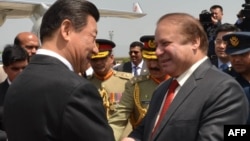Chinese President Xi Jinping’s meetings in Islamabad are planned to largely focus on broadening deep economic relations, but Pakistani officials say civilian and military leaders will also brief him on the progress in counter-militancy operations and efforts to promote peace in neighboring Afghanistan.
China’s billions of dollars in development projects are likely to gain headlines during Xi’s visit, but those plans are only half of a strategy aimed at simultaneously improving the region’s security issues along with its economy.
Pakistan’s tribal areas bordering Afghanistan have long harbored militant and terrorist groups that threaten the world, and China, too, sees pacifying this region as key to its own security.
Chinese security interests
Sartaj Aziz, Pakistan's national security and foreign policy adviser, told VOA the country's Zarb-e-Azb military operation has made gains against militants threatening Chinese interests.
"Pakistan and China have been cooperating" against terrorist threats, Aziz said, noting "operation Zarb-e-Azb in North Waziristan was an important step in destroying the [terrorist] infrastructure that was there. But some of this [terrorism] activity flows into Afghanistan. So, unless Pakistan, China and Afghanistan all cooperate in this counterterrorism effort, obviously, the problem would not be solved."
Beijing believes the tribal areas have provided a crucial haven and training ground for the East Turkistan Islamic Movement (ETIM). The movement's violent attacks over the past two years have killed hundreds of people, Chinese officials say.
Pakistan army officials say the Waziristan army offensive has killed hundreds of militants, including some linked to ETIM, but have released few details. Afghanistan also has handed over more than a dozen anti-China militants it captured on its soil in recent months.
But although China blames Xinjiang separatists for violent attacks at home, critics say China’s harsh crackdown on Islamic practices and the economic marginalization of the ethnic minority Uighur Muslims are the major causes of Xinjiang’s unrest.
In some parts of Xinjiang, Chinese authorities have banned publicly wearing Islamic attire such as veils. Last month, a United Nations official called the crackdown against Uighurs a "major problem."
However, that has not led to protests in Pakistan, where Islamist parties often take to the streets against Western nations, blaming them for anti-Islam policies.
Beijing engagement
In fact, both the Afghan and Pakistani governments have welcomed Beijing’s engagement in the region, especially because the bulk of U.S.-led international forces are withdrawing from Afghanistan and foreign assistance has declined.
Chinese authorities fear that, following the withdrawal, economic stagnation in both Pakistan and Afghanistan could threaten Xinjiang’s security.
Aziz, the Pakistan national security adviser, emphasized the need for both Pakistan and Afghanistan to better manage their mostly porous border, which stretches 2,400 kilometers or 1,491 miles. That could prevent terrorists, including those linked to the Islamic State and other groups, from settling in the region.
Beijing has refused Kabul’s request to open the narrow Wakhan Pass connecting the two countries, fearing it would fuel unrest in Xinjiang.
Tour operators lately have complained that, under Chinese pressure, no cross-border movement is allowed on Saturdays and Sundays at the Sust border post, which links Pakistan with Xinjiang.
Aziz said Pakistan has been cooperating with Afghanistan for at least two months on intelligence-sharing and other activities to stabilize the border. "If we succeed in these efforts of better border management and not allowing terrorists any space here, then of course it will also help the Chinese effort to stem this menace coming from this side of the border," he said.
Afghan peace process
China’s involvement in the Afghan peace process is also increasing. Beijing and Kabul hosted a conference of regional countries on how to end the Afghan conflict and called on the Taliban to join a national reconciliation process. Chinese officials also secretly hosted at least two rounds of talks with Taliban officials late last year, but neither side has offered any details.
Days before Xi’s visit to Pakistan, Beijing’s Ambassador to Islamabad Sun Weidong told VOA China would continue its role.
"We hope that Afghanistan enjoy[s] peace, stability and prosperity, and we would like to support a reconciliation process of Afghan-led and Afghan owned," Sun Weidong said. "So, that means that we respect their sovereignty and territorial integrity and we respect and support the wishes of Afghan people for peace and stability.... And we are ready to also support such a process in the future."
Key Taliban leaders are believed to be sheltering in Pakistan. Afghan officials hope China can persuade Islamabad to encourage the insurgent group to engage in peace talks with Kabul. However, Pakistani officials insist they're not allowing their soil to be used for violence against Afghanistan or another country.
Last week, in an historic first, Pakistan’s military invited the visiting Afghan military chief to attend and address a graduation ceremony of army cadets at Pakistan’s premier military academy in Abbottabad.
Analysts viewed the move as a strong message that two institutions long mistrustful of each other are forging a closer relationship.




